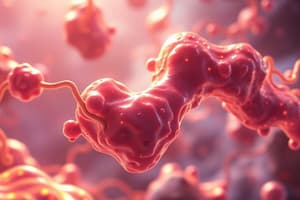Podcast
Questions and Answers
Which apolipoprotein is primarily associated with HDL and serves as a ligand for the HDL receptor?
Which apolipoprotein is primarily associated with HDL and serves as a ligand for the HDL receptor?
- Apo B-100
- Apo E
- Apo A-I (correct)
- Apo C-II
Which apolipoprotein acts as an activator of lipoprotein lipase and is essential for lipid metabolism?
Which apolipoprotein acts as an activator of lipoprotein lipase and is essential for lipid metabolism?
- Apo C-II (correct)
- Apo E
- Apo C-I
- Apo C-III
What is the primary metabolic role of Apo B-100 in the body?
What is the primary metabolic role of Apo B-100 in the body?
- Activates lecithin cholesterol acyltransferase
- Functions as a ligand for HDL receptors
- Inhibits lipoprotein lipase
- Controls the metabolism of LDL (correct)
Which apolipoprotein is synthesized in the intestine and is a truncated form of Apo B-100?
Which apolipoprotein is synthesized in the intestine and is a truncated form of Apo B-100?
High levels of which apolipoprotein are associated with an increased risk of atherosclerosis?
High levels of which apolipoprotein are associated with an increased risk of atherosclerosis?
Which apolipoprotein serves as an inhibitor for lipoprotein lipase and is linked to the regulation of lipid metabolism?
Which apolipoprotein serves as an inhibitor for lipoprotein lipase and is linked to the regulation of lipid metabolism?
Which of the following apolipoproteins is a strong predictor of cardiovascular disease (CVD)?
Which of the following apolipoproteins is a strong predictor of cardiovascular disease (CVD)?
Which apolipoprotein is involved in the clearance of lipoprotein particles by serving as a ligand for the LDL receptor?
Which apolipoprotein is involved in the clearance of lipoprotein particles by serving as a ligand for the LDL receptor?
Which lipoproteins are primarily rich in triacylglycerols?
Which lipoproteins are primarily rich in triacylglycerols?
Which of the following best describes the protein content of high-density lipoproteins (HDL)?
Which of the following best describes the protein content of high-density lipoproteins (HDL)?
How are lipoproteins classified based on their characteristics?
How are lipoproteins classified based on their characteristics?
Which lipoprotein moves fastest during electrophoresis due to its composition?
Which lipoprotein moves fastest during electrophoresis due to its composition?
Which apolipoprotein is primarily associated with low-density lipoproteins (LDL)?
Which apolipoprotein is primarily associated with low-density lipoproteins (LDL)?
What is a characteristic feature of lipoproteins with high lipid content?
What is a characteristic feature of lipoproteins with high lipid content?
Which process best describes how HDL transfers apolipoproteins to VLDL?
Which process best describes how HDL transfers apolipoproteins to VLDL?
What is the primary role of chylomicrons in lipid metabolism?
What is the primary role of chylomicrons in lipid metabolism?
Which statement accurately describes the role of the LDL receptor?
Which statement accurately describes the role of the LDL receptor?
What distinguishes the scavenger receptor from the LDL receptor?
What distinguishes the scavenger receptor from the LDL receptor?
Which lipoprotein receptor is primarily responsible for mediating the uptake of cholesteryl esters from HDL particles?
Which lipoprotein receptor is primarily responsible for mediating the uptake of cholesteryl esters from HDL particles?
High levels of which protein are closely associated with an increased risk of atherosclerosis?
High levels of which protein are closely associated with an increased risk of atherosclerosis?
Which of the following statements about lipoprotein receptors is true?
Which of the following statements about lipoprotein receptors is true?
In which cells is the Class B Scavenger Receptor B1 (SR-B1) primarily expressed?
In which cells is the Class B Scavenger Receptor B1 (SR-B1) primarily expressed?
What is the function of the LDL receptor-related protein (LRP)?
What is the function of the LDL receptor-related protein (LRP)?
Which of the following characteristics is unique to scavenger receptors compared to LDL receptors?
Which of the following characteristics is unique to scavenger receptors compared to LDL receptors?
Study Notes
Fatty Acid Transport
- Short and medium-chain fatty acids are transported in the blood bound to albumin.
- Other lipids are transported in the blood as part of lipoproteins.
Lipoproteins
- Lipoproteins are complexes of proteins and lipids.
- Have a hydrophilic external surface composed of free cholesterol, phospholipids, and apolipoproteins.
- Have a hydrophobic core composed of cholesterol esters and triacylglycerols.
Lipoprotein Classification
- Lipoproteins are classified by their density, diameter, protein, phospholipid, and triacylglycerol content.
Types of Lipoproteins
- Chylomicrons: Largest and least dense, primarily transport dietary triacylglycerols.
- Very Low-Density Lipoproteins (VLDL): Transport triacylglycerols from the liver to tissues.
- Intermediate-Density Lipoproteins (IDL): Intermediate in size and density, formed by the breakdown of VLDL.
- Low-Density Lipoproteins (LDL): Primarily carry cholesterol to tissues.
- High-Density Lipoproteins (HDL): Smallest and densest, transport cholesterol from tissues back to the liver.
Lipoprotein Significance
- Chylomicrons and VLDL are rich in triacylglycerols.
- LDL and HDL are rich in cholesterol.
Lipoprotein Separation
- Lipoproteins can be separated based on their density and size using centrifugation.
- Lipoproteins with high lipid content have low density and float during centrifugation.
- Lipoproteins with high protein content have high density and sediment during centrifugation.
Electrophoresis
- Chylomicrons (fed state) migrate the slowest during electrophoresis.
- Beta lipoprotein (LDL) migrates next fastest.
- Pre-beta lipoprotein (VLDL) migrates slower than LDL.
- Alpha lipoprotein (HDL) migrates the fastest.
Apolipoproteins
- Protein components of lipoprotein particles.
- ApoB: Embedded in the particle surface, cannot be easily removed.
- ApoC: Loosely bound, can be transferred between lipoproteins.
Roles of Apolipoproteins
- Determine lipoprotein metabolic fate through interactions with cellular receptors.
- Activate and inhibit enzymes involved in lipoprotein metabolism.
Key Apolipoproteins
- Apo AI: Major component of HDL, activator of lecithin cholesterol acyltransferase (LCAT), ligand for HDL receptor.
- Apo AII: Protein component of HDL, inhibitor of Lipoprotein Lipase.
- Apo B100: Major structural component of VLDL, IDL, and LDL, ligand for LDL receptor.
- Apo B48: Truncated form of ApoB100, controls chylomicron metabolism, not recognized by LDL receptor.
- Apo CI: Inhibitor of cholesteryl ester transfer protein.
- Apo CII: Activator of lipoprotein lipase.
- Apo CIII: Inhibitor of lipoprotein lipase.
- Apo E: Found in VLDL, HDL, chylomicrons, and chylomicron remnants, ligand for LDL receptor, controls receptor binding of remnant particles.
- Apo (a): Component of lipoprotein (a), attached to Apo B-100, inhibitor of fibrinolysis, enhances lipoprotein uptake by macrophages.
Lipoprotein Receptors
- LDL Receptor: Present in the liver and most tissues, recognizes ApoB100 and ApoE, mediates LDL uptake.
- Scavenger Receptor: Present on cell membranes, non-specific and non-regulated, binds chemically modified LDL.
- Class B Scavenger Receptor B1 (SR-B1): Expressed in liver, adrenal glands, ovaries, testes, macrophages, and other cells, mediates selective uptake of cholesterol esters from HDL.
Receptor Significance
- LDL receptor regulates the uptake of LDL, chylomicron remnants, and IDL.
- LRP recognizes Apo E.
- SR-B1 mediates the selective uptake of cholesterol esters from HDL and facilitates cholesterol efflux.
Studying That Suits You
Use AI to generate personalized quizzes and flashcards to suit your learning preferences.
Related Documents
Description
This quiz explores the transport mechanisms of fatty acids and lipoproteins in the blood. You'll learn about the types of lipoproteins, their classifications, and their roles in lipid metabolism. Test your knowledge on how lipoproteins function and their impact on health.





